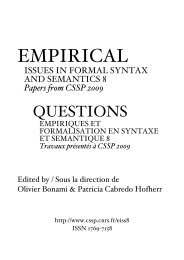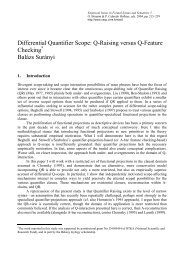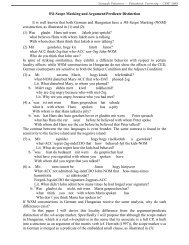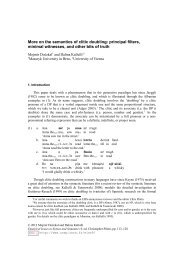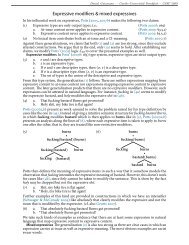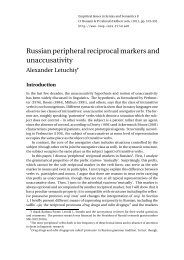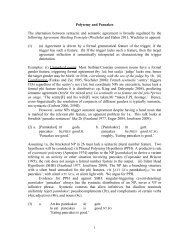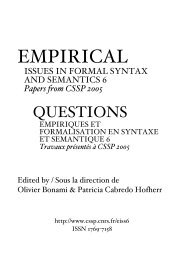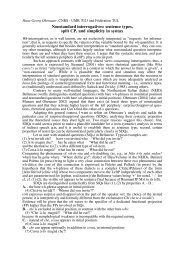Empirical Issues in Syntax and Semantics 9 (EISS 9 ... - CSSP - CNRS
Empirical Issues in Syntax and Semantics 9 (EISS 9 ... - CSSP - CNRS
Empirical Issues in Syntax and Semantics 9 (EISS 9 ... - CSSP - CNRS
You also want an ePaper? Increase the reach of your titles
YUMPU automatically turns print PDFs into web optimized ePapers that Google loves.
group of people constitut<strong>in</strong>g the only authors even if Scott <strong>and</strong> Ballantyne are not the only <strong>in</strong>dividuals<br />
<strong>in</strong> that group. But our solution does not rely on the empt<strong>in</strong>ess of the extension of the<br />
description conta<strong>in</strong><strong>in</strong>g the exclusive; it works here too. The presupposition of the def<strong>in</strong>ite article<br />
is satisfied <strong>in</strong> this case, because the description still characterizes a s<strong>in</strong>gle entity.<br />
The predicate that THE comb<strong>in</strong>es with is MAX_SORT(ONLY(*AUTHOR)), which turns out<br />
to be equal to ONLY(*AUTHOR)). To see this, let us exp<strong>and</strong> the expression:<br />
(23) MAX_SORT(ONLY(*AUTHOR))<br />
= λx . [ONLY(*AUTHOR)(x) ∧ ∀y[x ⊏ i y → ¬ONLY(*AUTHOR)(y)]]<br />
= λx : *AUTHOR(x) . ∀y[x ⊏ i y → ¬*AUTHOR(y)] ∧ ∀y[x ⊏ i y → ¬ONLY(*AUTHOR)(y)]<br />
The first at-issue condition on the f<strong>in</strong>al l<strong>in</strong>e (∀y[x ⊏ i y → ¬*AUTHOR(y)]) requires that noth<strong>in</strong>g<br />
that x is a part of satisfies *AUTHOR. The second condition (∀y[x ⊏ i y → ¬ONLY(*AUTHOR)(y)])<br />
requires that noth<strong>in</strong>g that x is a part of satisfies ONLY(*AUTHOR). Noth<strong>in</strong>g that fails to satisfy<br />
*AUTHOR can satisfy ONLY(*AUTHOR), so the second condition is implied by the first condition.<br />
Hence:<br />
(24) MAX_SORT(ONLY(*AUTHOR))<br />
= λx : *AUTHOR(x) . ∀y[x ⊏ i y → ¬*AUTHOR(y)]<br />
= ONLY(∗AUTHOR)<br />
In other words, MAX_SORT(ONLY(*AUTHOR)) <strong>and</strong> ONLY(*AUTHOR) are equivalent.<br />
Furthermore, they are both guaranteed to satisfy the weak uniqueness presupposition of the<br />
def<strong>in</strong>ite article. For any x such that ONLY(*AUTHOR)(x), there is no y dist<strong>in</strong>ct from x such that<br />
ONLY(*AUTHOR)(y). Thus |ONLY(*AUTHOR)| ≤ 1, so |MAX_SORT(ONLY(*AUTHOR)) ≤ 1 as<br />
well. This means that THE(MAX_SORT(ONLY(*AUTHOR))) is ONLY(*AUTHOR). Hence ‘the<br />
only authors of Waverley’ has the follow<strong>in</strong>g denotation.<br />
(25) THE(MAX_SORT(ONLY(*AUTHOR)))<br />
= THE(ONLY(*AUTHOR))<br />
= [λP : |P| ≤ 1 . P](ONLY(*AUTHOR))<br />
= ONLY(*AUTHOR)<br />
If we apply this predicate to S ⊕ B, we get the follow<strong>in</strong>g denotation for ‘Scott <strong>and</strong> Ballantyne<br />
are the only authors of Waverley’:<br />
(26) ONLY(*AUTHOR)(S ⊕ B)<br />
This is def<strong>in</strong>ed if *AUTHOR(S⊕B), <strong>and</strong> true if there is no y such that S⊕B ⊏ i y <strong>and</strong> *AUTHOR(y).<br />
In other words, it is correctly predicted that (17) presupposes that Scott <strong>and</strong> Ballantyne are authors<br />
of Waverley, <strong>and</strong> has as its at-issue content that there are no more authors of Waverley.<br />
The negated version (18) reta<strong>in</strong>s the presupposition that Scott <strong>and</strong> Ballantyne are authors of<br />
Waverley, <strong>and</strong> has as its at-issue content that it is not the case that there are no more authors of<br />
Waverley; hence, there are authors of Waverley other than Scott <strong>and</strong> Ballantyne. Our assumptions<br />
therefore correctly capture anti-uniqueness effects with both s<strong>in</strong>gular <strong>and</strong> plural def<strong>in</strong>ite<br />
descriptions conta<strong>in</strong><strong>in</strong>g exclusives.<br />
66



